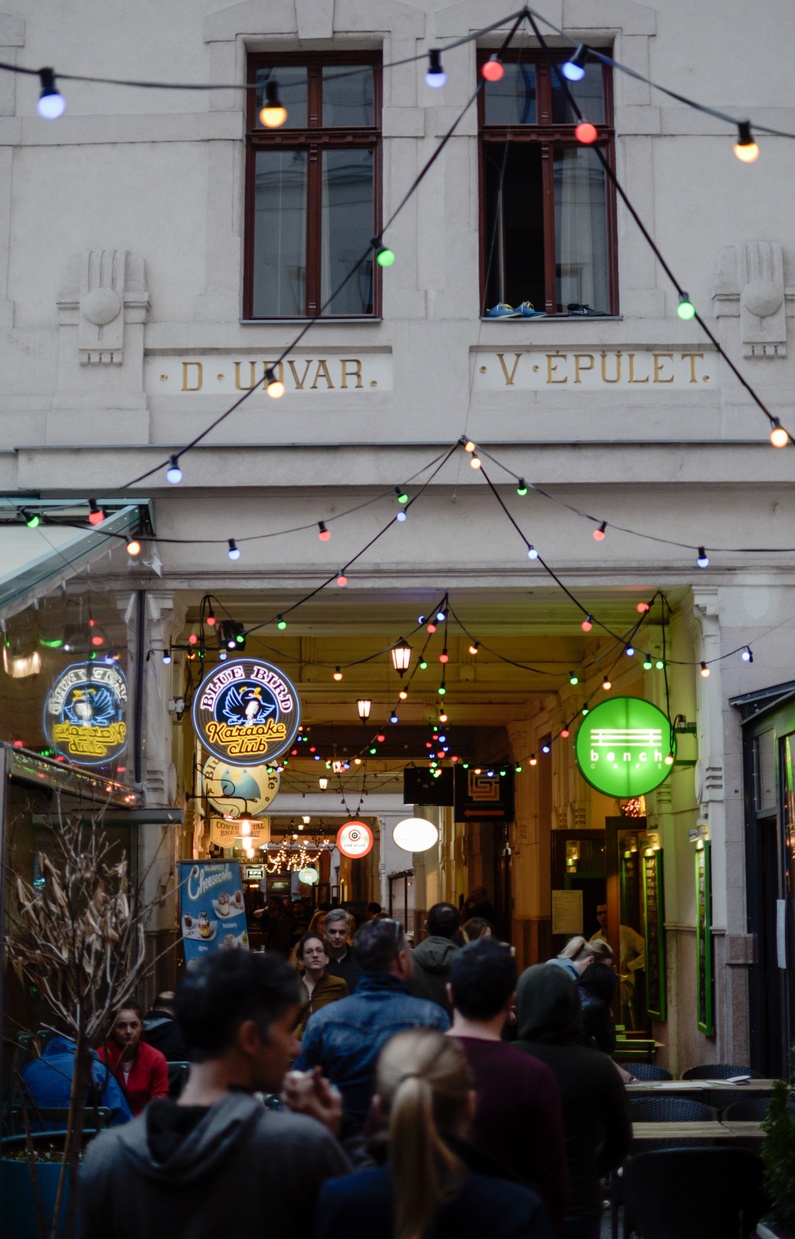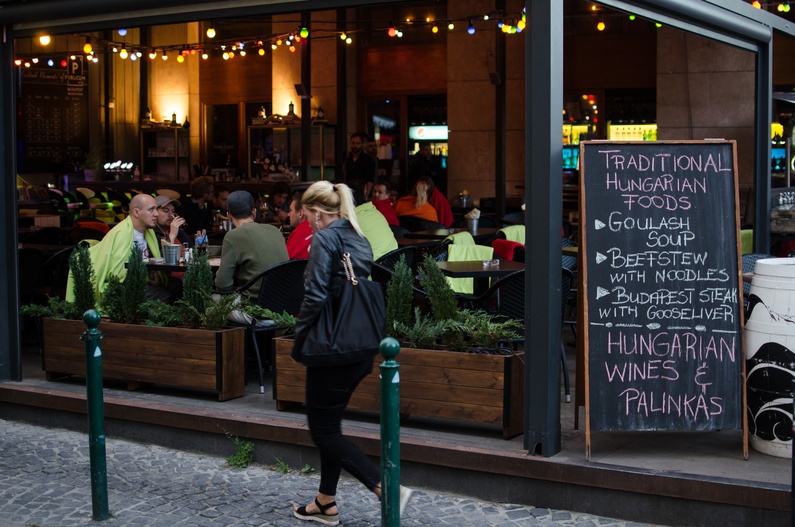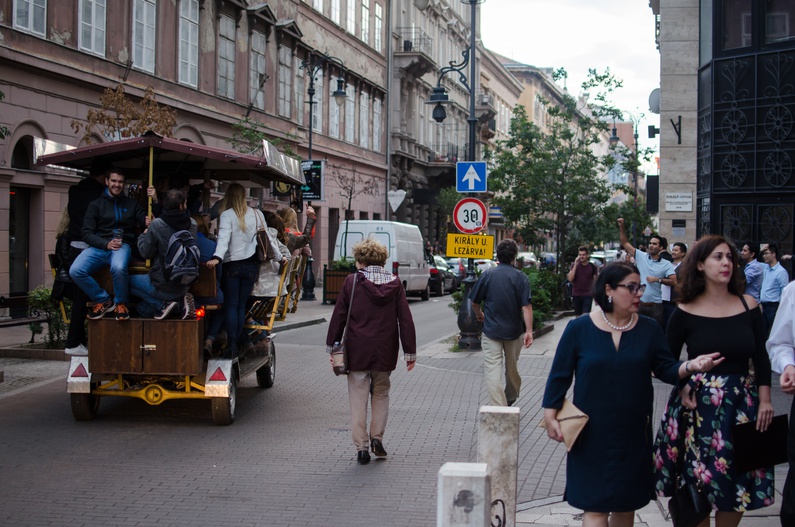
Party Tourism in Budapest: A Neighbourhood Revolt
Created on
Translation by:
Nicole Y. AdamsArticle in en
Barcelona has it, so have Berlin and Amsterdam – and now it’s hit Budapest as well: a problem with party tourism. In Barcelona, an increasing number of civilian action groups have formed to combat mass tourism. But in Budapest, the realisation that tourists and Airbnb don’t just bring in money, but also bring decay and the gentrification of historic districts, seems to be dawning very slowly on people.
When I moved to the 7th district in Budapest in 2008, it was a veritable insider tip for foreign students. With its turbulent history, it seemed that the former Jewish quarter was just awakening from a fairy tale sleep and metamorphosing into a chic and vibrant district. Here, where the Jewish community flaunted its wealth confidently before the Second World War and erected the second largest synagogue in the world, a new fusion of cultures and religions began to emerge at the end of the first decade of the 21st century. More and more Hungarian Jews were returning, and the wounds which the district had suffered during the holocaust – it was declared a ghetto in 1944 – seemed to be healing slowly but surely.
Opposite my apartment in Király utca, once a flourishing shopping street, young Jews, artists and hipsters met in the legendary Sirály Bar. Located on the next intersecting street was Szimpla Kert – a bar which had opened up in 2002 in the middle of a derelict house, and which quickly advanced to become something of an institution in Budapest’s night life. Szimpla was somewhere you went spontaneously to drink a beer or two, ensconced in the old flea market sofas, to chat with other foreign students and enjoy the special atmosphere. Everything was a bit improvised here; the interior furnishings were hotch-potch and the facade was crumbling. It was definitely more shabby than chic – but you’d always find a free table. The world was alright here in Erzsébetváros, as the 7th district is called.
By 2010, I was being woken up more and more often by drunken tourists partying into the small hours beneath my window. When I walked the streets the next day, I would trip over the human waste and empty plastic cups they’d left behind. That was when I packed my bags. More and more bars were opening in ‘my’ street, all zeroing in on tourists, with cheap alcohol virtually leaping off the pages of the brightly coloured menus. I found I was less and less able to identify with the district.
Hungarians are rare species here
The underground scene in Budapest, which met in the ruins of old apartment blocks and derelict inner courtyards, was shifted to make space for commercial tourism. The ‘ruin bars’ were declared to be Hungary’s top attraction, and suddenly Budapest was all the rage amongst young tourists. Travel guides, airlines and online web portals sang the praises of Budapest’s ruin bars; in 2012, Szimpla was voted the world’s third best bar by Lonely Planet. Ever since, there have been metre-long queues in front of the mother of all ruin bars. You’ll hardly ever find a native Hungarian drinking beer here.
Huge complexes – such as the Gozsdu udvar, which houses countless bars, clubs and restaurants and covers a surface area of more than 12,000 square metres – have now sprung up, and whole streets in the 7th district have dedicated themselves to feeding and entertaining tourists, the number of which has accordingly swelled to between ten and twenty thousand every day during the peak season. According to the estimates of restaurant owners, roughly 80% of all diners in the new party district are tourists – making them the primary source of income for this district. But it’s no longer possible to turn a blind eye to the negative impact of this mass tourism.
According to TourMIS, the Austrian Tourism Information Service, more than 3.3 million people visited Budapest in 2016. At the same time, the 7th district lost 1,171 residents. Since the start of mass tourism in Budapest, more than 8,000 residents have left the Jewish quarter. Those who could no longer bear the noise and dirt – and who could afford to leave – sold their property for less than the market value and looked for somewhere more peaceful to live. This, however, remained the exception.
Not until 2016 did apartments here start selling for their actual market price again. Many, however – particularly older people, who have lived here for decades – can’t afford to move. People like Mari néni, who has lived in her two-bedroom apartment in Király utca for more than forty years: ‘I don’t feel safe when I go to the shops. Young people often bump into me, and usually they’re out in groups. Unfortunately, the streets here are very narrow, so there’s no way to dodge them.’ Above all, Mari néni dislikes the noise which tourists make in neighbouring apartments. ‘They arrive home late, make a lot of noise and leave their rubbish everywhere.’
 The Jewish lady is primarily referring to tourists who book their accommodation via Airbnb. Of the 24 apartments in her block, no fewer than 15 are now rented out via Airbnb – a lucrative business for (primarily foreign) investors, but an unacceptable situation for the residents who still live here. Up to 8,000 apartments like these are registered on the Hungarian Airbnb website. Nor are all the tourists who book their accommodation via this service provider included in the official head count. Realistically, this means that up to 4.5 million tourists visit Budapest every year.
The Jewish lady is primarily referring to tourists who book their accommodation via Airbnb. Of the 24 apartments in her block, no fewer than 15 are now rented out via Airbnb – a lucrative business for (primarily foreign) investors, but an unacceptable situation for the residents who still live here. Up to 8,000 apartments like these are registered on the Hungarian Airbnb website. Nor are all the tourists who book their accommodation via this service provider included in the official head count. Realistically, this means that up to 4.5 million tourists visit Budapest every year.
Controversial party fever in Central Europe
The city owes its high level of popularity, particularly amongst young tourists, to its low-budget deals and controversial reputation as the ‘Party Capital of Central Europe’. The implications can be seen first-hand on any normal day in the centre of Budapest. Groups of anything from ten to thirty young men, dressed as Vikings, captains or prisoners, boozing their way through extended stag parties, totally without inhibitions.
Here, event agencies are constantly developing new strategies to kowtow to the demands of predominantly British clients in search of the perfect stag do. Websites with explicit names such as stagheavenbudapest or stagparadisebudapest offer entire packages and promise to give the boys the time of their life. A boat cruise on the Danube complete with a stripper; beer bike tours through the centre of the city; pub crawls, paintball and a trip to the historic thermal bath to relax at the end. Sightseeing tours are also available, reports an employee from the event agency, but these are rarely booked. For the last few months, it’s been her job to accompany groups of men on their tours and make sure they have a great time and everything is to their satisfaction. Experience has taught her that ‘Most of them just want to drink as much alcohol as they can, as quickly as they can, meet pretty Hungarian girls, and spend as little money as possible on their party.’
 In recent years, Budapest’s reputation for party tourism and value for money has overtaken that of Prague, the former party epicentre in Central Europe. In Prague, tourists spend €550 on average during their stay; in Budapest, they only spend €325. But there’s another downside to party tourism in Budapest, as became vividly evident in a recent incident involving the death of British man Sam Clancy. During a stag party, Clancy became separated from the rest of his group of 22 men and was hit by a car while attempting to cross a road.
In recent years, Budapest’s reputation for party tourism and value for money has overtaken that of Prague, the former party epicentre in Central Europe. In Prague, tourists spend €550 on average during their stay; in Budapest, they only spend €325. But there’s another downside to party tourism in Budapest, as became vividly evident in a recent incident involving the death of British man Sam Clancy. During a stag party, Clancy became separated from the rest of his group of 22 men and was hit by a car while attempting to cross a road.
A peaceful night’s sleep? Overrated
If you ask those responsible at BFTK (Budapesti Fesztivál-és Turisztikai Központ; Tourism & Festival Marketing), there’s still room for more tourism in Budapest. They’ve developed a strategy plan entitled ‘Moving on’ which aims to revamp the city’s party image and market Budapest as a high-quality travel destination with excellent cuisine. The long-term aim: to catch up with Prague and Vienna in the race to become Central Europe’s most popular city. With more than 5 million visitors per year, Prague and Vienna both still top the list – but tourism in Budapest has grown disproportionately in the last two years. Although the city marketing board is now focusing on quality and culture, young tourists are still the target group. Their thought process is that if you come and spend a weekend in Budapest as a young tourist, you’ll come back later as an adult, with your pockets full of money.
However, there are no specific strategies for ensuring tourism develops hand in hand with residents in the city centre, particularly with residents of the 7th district. Initial plans foresee diverting tourists away from the city centre and introducing stricter rules for the countless hop-on-hop-off buses. But Gábor Devosa and Dr Tibor Kispál, representatives for Erzsébetváros city council, are convinced that this isn’t enough. Ever since the leading government party Fidesz took over the 7th district, important provisions which were designed to protect the locals have been rescinded. In 2013, for example, they abolished the law which said bars and clubs required explicit consent from residents in order to remain open after midnight. Ever since, it is not uncommon for such establishments in Erzsébetváros to remain open until 5 or 6 a.m. The economic gain was deemed more important than a good night’s sleep for the local residents.
However, to say that the money spent by party tourists in the 7th district is also administered by the 7th district, would be to draw a false conclusion, according to Gábor Devosa: ‘Although we have to deal with the impact of tourism, the city only gives us a certain percentage, calculated on the number of residents.’ So when it comes to cleaning up and getting rid of all the party rubbish, Erzsébetváros is left in the lurch – even though the whole of Budapest benefits economically from the tourism. Nor is this the only area in which they feel abandoned. Dr Kispál’s accusation is directed primarily against the government, who appear to have completely ignored the issue of safety in Erzsébetváros: ‘It’s impossible to maintain the same safety and security standards here with the same ten policeman we had years ago. Every evening, there are up to 20,000 tourists out and about on the streets.’
Ábel Zsendovits, co-founder of the Szimpla, confirms that it’s virtually impossible for so few police officers to effectively master the chaos each night: ‘We’ve started using our own staff to patrol the streets.’ Accidents, criminality, drugs and prostitution are daily occurrences in the 7th district; party tourism and its impact have spiralled into an uncontrolled problem here. With regard to party tourism, Devosa and Kispál agree that the district has passed the point of no return. The only way to curb and control it is to sit all the decision-makers down at one table and find a solution together. The government, the tourist authorities, the police, barkeepers, city councillors and residents need to find solutions which are acceptable for all concerned. At any rate: ‘It can’t go on like this!’ emphasises Gábor Devosa.
Erzsébetváros: Neighbours take precendence over tourists!
Where politics fail, civilian action groups take the lead to find solutions. Those who have remained living in Erzsébetváros, who feel a close bond with the district and who don’t want to be ousted by the party tourists, join the ‘Élhetö Erzsébetváros’ group (Élhetö Erzsébetváros). Despite all the vandalism, noise, dirt and criminality in the district, the people who live here want to join forces and fight to improve the situation. Politician Attila Vajnai, who is a member of the group, is ‘committed to finding democratic and socially legitimate solutions’ and particularly wishes it were possible to sleep with the window open during the summer months. He’s convinced that unregulated Airbnb bookings are the biggest problem. Up to now, these have not been supervised by the state, nor do legal restrictions and regulations apply.
Unlike other European countries, Hungary has not passed any laws to make it a punishable offence when private accommodation is rented out illegally. It’s Vajnai’s intention to make sure this changes soon. Together with communities of residents, the politician aims to assert the ‘legal means of an EU state’ to curb Airbnb and the like in Budapest. The aim is not to impose fines of up to €600,000 as is the case in Barcelona; nor is the aim to vilify tourism in general. But the residents of Erzsébetváros would rather say goodbye to tourists than to their neighbours.
Translated from Partytourismus in Budapest: Der Aufstand der Nachbarn by Nicole Y. Adams.



